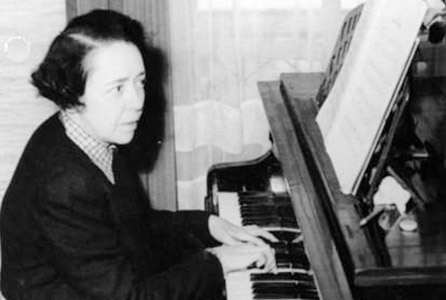
France
Jeanne Leleu was born in 1898 in Saint-Mihiel (Meuse). Her mother was a piano teacher and her father was an army bandmaster. She entered the Paris Conservatory at age nine, and won a first prize for piano in 1913, in the class of Alfred Cortot. She had already been noticed for her performance, alongside Geneviève Durony, of Ravel’s Ma Mère l’Oye in 1910. Afterwards, she set her sights on composition. In 1919, she won a first prize for counterpoint in the class of Georges Caussade, and in 1922 – the year she wrote her Quatuor avec piano – she won a first prize for composition in the class of Charles-Marie Widor, who encouraged her to attempt the Prix de Rome. On her second attempt, in 1923, she won the First Grand Prize for her cantata Béatrix. Her stay in Rome, which lasted until 1927, was prolific: of particular note are Six sonnets de Michel-Ange (1924) for voice and orchestra, Esquisses italiennes (1926) and Deux Danses (1927) for orchestra, Suite symphonique (1926) for wind instruments, and Le Cyclope (1928), stage music for the play by Euripides. Her Croquis de théâtre were performed to great success at the 1932 Concerts Colonne, as was her symphonic suite Transparences (1931) based on poems by Gide and Valéry, performed in 1933 at the Concerts Straram and reprised in 1935 by the Société des Concerts du Conservatoire. Critics particularly lauded her mastery of the orchestra’s timbres. During this period, she also wrote her Concerto pour piano et orchestre (circa 1935), which she performed herself at the Concerts Lamoureux in 1937. She was also noticed for her ballets. Un jour d’été was performed in 1940 at the Opéra-Comique and reprised in the postwar. A 1947 commission from Radiodiffusion française, Femmes, which discusses the typical roles for women in operettas, was also conceived as a ballet. Nautéos, a ballet in three acts, was performed in Monte-Carlo in 1947 and reprised at the Paris Opera and at Covent-Garden in 1954. That same year, she was named professor of harmony at the Conservatory, a post she occupied until 1965.
– Florence Launay, based on Odile Bourin –
[Traduction en anglais : Raphaël Meyer]
– Florence Launay, based on Odile Bourin –
[Traduction en anglais : Raphaël Meyer]
List of Works
Useful links
Contributor:
Présence Compositrices - last updated 10 December 2025